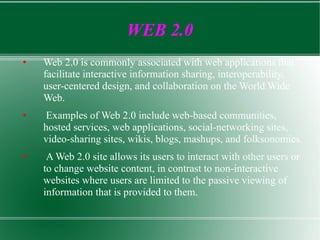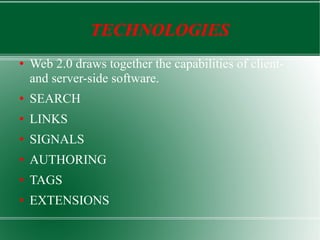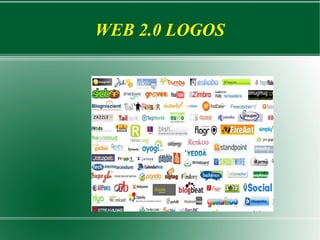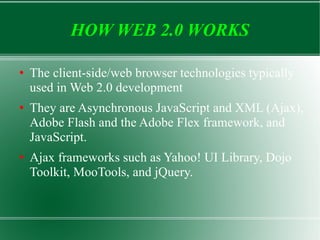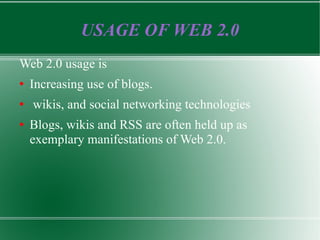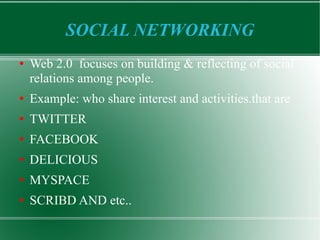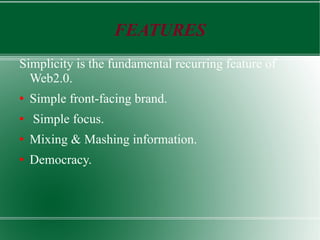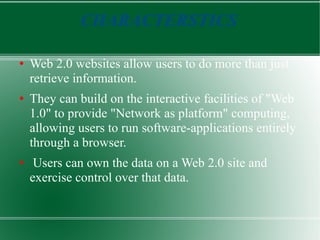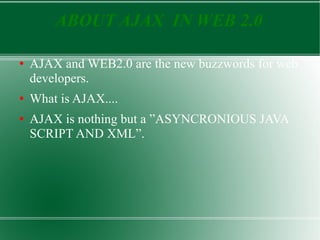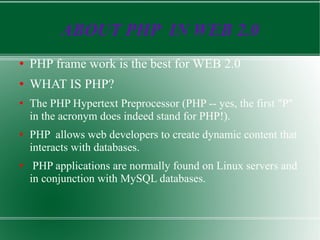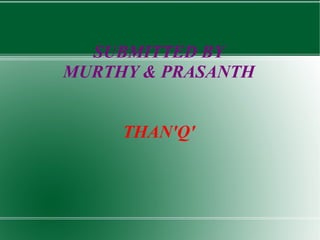Web 2 0
- 1. WEB 2.0 Web 2.0 is commonly associated with web applications that facilitate interactive information sharing, interoperability, user-centered design, and collaboration on the World Wide Web. Examples of Web 2.0 include web-based communities, hosted services, web applications, social-networking sites, video-sharing sites, wikis, blogs, mashups, and folksonomies. A Web 2.0 site allows its users to interact with other users or to change website content, in contrast to non-interactive websites where users are limited to the passive viewing of information that is provided to them.
- 2. TECHNOLOGIES Web 2.0 draws together the capabilities of client- and server-side software. SEARCH LINKS SIGNALS AUTHORING TAGS EXTENSIONS
- 4. HOW WEB 2.0 WORKS The client-side/web browser technologies typically used in Web 2.0 development They are Asynchronous JavaScript and XML (Ajax), Adobe Flash and the Adobe Flex framework, and JavaScript. Ajax frameworks such as Yahoo! UI Library, Dojo Toolkit, MooTools, and jQuery.
- 5. USAGE OF WEB 2.0 Web 2.0 usage is Increasing use of blogs. wikis, and social networking technologies Blogs, wikis and RSS are often held up as exemplary manifestations of Web 2.0.
- 6. SOCIAL NETWORKING Web 2.0 focuses on building & reflecting of social relations among people. Example: who share interest and activities.that are TWITTER FACEBOOK DELICIOUS MYSPACE SCRIBD AND etc..
- 7. FEATURES Simplicity is the fundamental recurring feature of Web2.0. Simple front-facing brand. Simple focus. Mixing & Mashing information. Democracy.
- 8. CHARACTERSTICS Web 2.0 websites allow users to do more than just retrieve information. They can build on the interactive facilities of "Web 1.0" to provide "Network as platform" computing, allowing users to run software-applications entirely through a browser. Users can own the data on a Web 2.0 site and exercise control over that data.
- 9. ABOUT AJAX IN WEB 2.0 AJAX and WEB2.0 are the new buzzwords for web developers. What is AJAX.... AJAX is nothing but a ŌĆØASYNCRONIOUS JAVA SCRIPT AND XMLŌĆØ.
- 10. ABOUT PHP IN WEB 2.0 PHP frame work is the best for WEB 2.0 WHAT IS PHP? The PHP Hypertext Preprocessor (PHP -- yes, the first "P" in the acronym does indeed stand for PHP!). PHP allows web developers to create dynamic content that interacts with databases. PHP applications are normally found on Linux servers and in conjunction with MySQL databases.
- 11. SUBMITTED BY MURTHY & PRASANTH THAN'Q'
